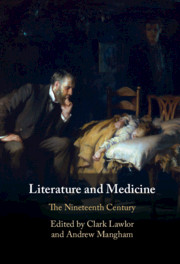Book contents
- Literature and Medicine
- Literature and Medicine
- Copyright page
- Contents
- Contributors
- Acknowledgements
- Introduction
- Part I Epistemologies
- Part II Professionalisation
- Part III Responses
- Chapter 8 Disorders of the Age
- Chapter 9 Medicine, Sanitary Reform, and Literature of Urban Poverty
- Chapter 10 Flexible Bodies, Astral Minds
- Chapter 11 The Other ‘Other Victorians’
- Chapter 12 Physical ‘Wholeness’ and ‘Incompleteness’ in Victorian Prosthesis Narratives
- Index
Chapter 10 - Flexible Bodies, Astral Minds
Gendered Mind–Body Practices and Colonial Medicine
from Part III - Responses
Published online by Cambridge University Press: 04 June 2021
- Literature and Medicine
- Literature and Medicine
- Copyright page
- Contents
- Contributors
- Acknowledgements
- Introduction
- Part I Epistemologies
- Part II Professionalisation
- Part III Responses
- Chapter 8 Disorders of the Age
- Chapter 9 Medicine, Sanitary Reform, and Literature of Urban Poverty
- Chapter 10 Flexible Bodies, Astral Minds
- Chapter 11 The Other ‘Other Victorians’
- Chapter 12 Physical ‘Wholeness’ and ‘Incompleteness’ in Victorian Prosthesis Narratives
- Index
Summary
This chapter explores how late nineteenth-century self-care guides, exercise manuals, and travel handbooks began to integrate Eastern physical and spiritual practices as health advice. It considers how European and American women became increasingly intrigued by and immersed within practices such as meditation, yoga exercises (asana), and breathing methods (pranayama). Tracing connections between gender and empire, the chapter suggests that engagement with Indian yogic philosophies and physical practices offered women alternatives to Western medicine – an increasingly institutional system from which they were often excluded. In a culture where medical and scientific practices increasingly limited women’s participation and sometimes stifled their capabilities and experiences, many women turned to foreign spaces as sites of healing and participated within alternative systems of self-care that encouraged more flexible and intuitive ways of thinking about the body and its relationship to the mind and spiritual practices.
- Type
- Chapter
- Information
- Literature and MedicineThe Nineteenth Century, pp. 193 - 210Publisher: Cambridge University PressPrint publication year: 2021

